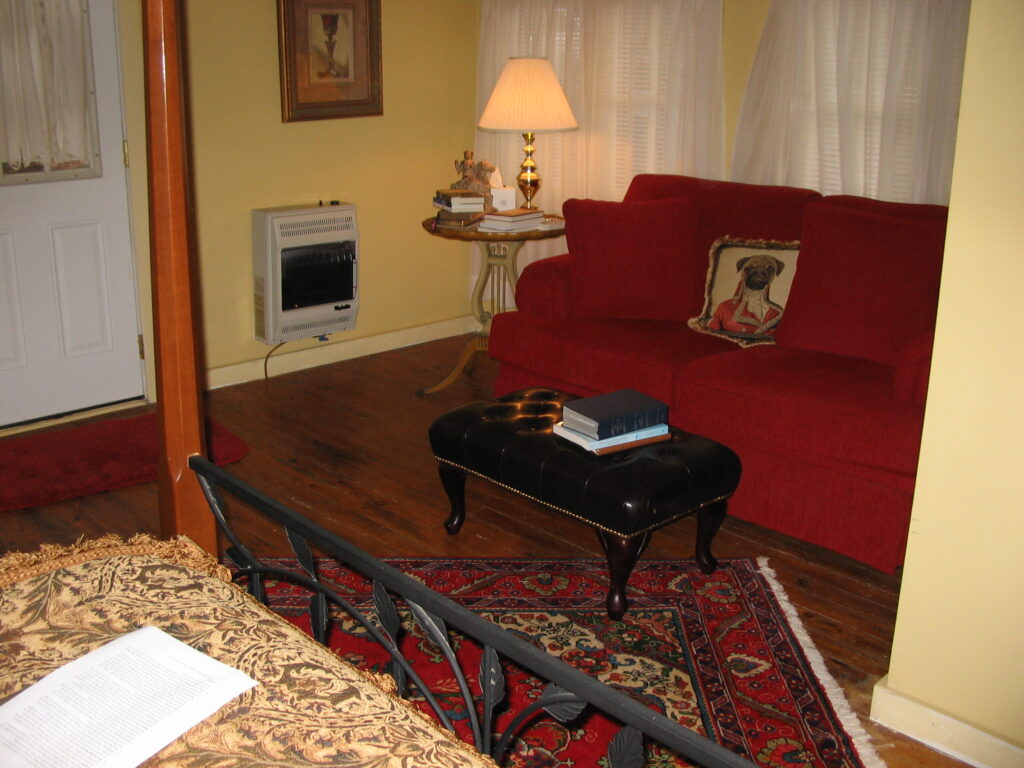I’ve been taking a class on essay writing that has opened up a whole new world of possibilities, self-reflection, and a world of fun. Here’s a first draft of my first week’s assignment. As a side note, it’s interesting that three or four of us in the class independently chose the theme of “coming home.” Definitely a universal theme.


On a brisk winter morning, curled under a heavy damask bedspread, I opened my eyes and drank in the surrounding beauty. A smile tugged at the corner of my lips as my eyes fell to an overstuffed, antique love seat the color of red Christmas berries across the room, flanked by a heavy walnut side table.
On the table stood a vase of white roses, which I had ordered for myself before arriving. Granted, the decor was a bit more formal and traditional that I would have liked, but something about it gave the place a feeling of stability, which I needed. The morning sun shone through the open blinds, casting a swath of light from the bed to the loveseat, a place that had become for me just yesterday a sacred space, a place of rest, and an invitation to more.
The Inn at Meander Plantation


Although I had just arrived at the Inn at Meander Plantation, a bed and breakfast located in Orange, Virginia, late yesterday afternoon, the quaint, one-room cottage I occupied felt familiar in some strange way that I could not yet define. It felt like home.
I gazed out the window at the peaceful rolling hills and the horses grazing on the knoll, and it stirred within me a longing that ambushed me with such fierceness that I began to cry—at the beauty of my surroundings, at my state of spiritual and emotional brokenness, and at the presence God in this place.
Deadlines at the office, a toxic work environment, and strained family relationships had left me little more than an empty shell, hard on the outside but filled with grief, exhaustion, and despair on the inside. And the isolation of living with a handful of autoimmune diseases, while trying to juggle a full-time job and freelancing for magazines, left me undone. There was nothing left.
But with my tears came a sweet release, as if I had just handed over a weighted suitcase of broken dreams, crushed hopes, and a bone-deep weariness to a porter. I sank into the overstuffed cushions of the berry-red loveseat, deciding which of the three books before me I would dig into first—my Bible, my journal, or the book whose title named the state of my soul, Longing for More by Ruth Haley Barton.
Longing for More


Longing for More won out, and after just a few pages, I found myself lost in the beauty of Barton’s words, captured by an artful phrase expanding on the necessity for the inner and outer worlds to align.
She “named” what had been stirring within me for so long, a sense that my inner and outer worlds were not in harmony. Pen in hand, I scribbled furiously in the margins and underlined this quote from Anne Morrow Lindbergh:
I want first of all to be at peace with myself. I want a singleness of eye, a purity of intention, a central core to my life to help me carry out these activities and obligations as well as I can. I want, in fact, to live “in grace” as much of the time as possible. By grace I mean an inner harmony, essentially spiritual, which can be translated into outward harmony.
I needed a central core to my life, an overriding sense of purpose and vision for my life. While I had spent years doing “good” things, not all of them suited my temperament, my gift cluster, or my strengths. . .

